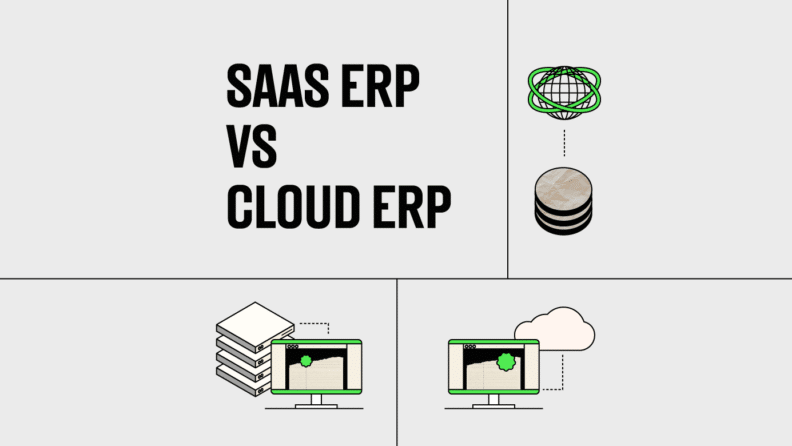Ever had a tough time choosing between two seemingly similar things? I have.
Just like picking the perfect pair of jeans from a stack of nearly identical-looking ones, deciding between SaaS ERP and Cloud ERP gets a lot of people stuck.
They look and fit alike, but are they really the same?
Kind of… but not totally. There’s more to this story, including hosting models, delivery methods, and a few other features that set them apart.
SaaS ERP — Brief Explanation
SaaS ERP is the off-the-shelf version of online enterprise resource planning systems.
Imagine if David had Goliath’s strength—this system levels up small and mid-sized businesses with faster implementations, better security measures, seamless scalability possibilities, and potential cost savings. It boasts:
- Quicker ERP implementations that let you hit the ground running.
- Security measures to keep your data safe.
- Scalability features so you can grow without outgrowing your system.
Cloud ERP — Brief Explanation
Cloud ERP software is the customizable giant of the online ERP universe. While it’s still delivered online, getting a system is a much more extensive undertaking.
Envision an architecturally advanced fortress—this system gives businesses of all sizes a blend of robust flexibility, advanced customization options, access from anywhere, and operational efficiency. It excels with:
- Advanced customization options to tailor the system exactly to your business needs.
- Enhanced control over updates and upgrades, putting you in the driver’s seat.
- Choice over your infrastructure partners; choose a private, public, or hybrid cloud to suit your security and compliance needs.
- Potential cost savings over the long-term, as you’ll own the system outright.
The Key Differences Between SaaS and Cloud ERP
Though the two types of ERP system are extremely similar, a few categories set them apart:
1. Deployment and Management
SaaS ERP systems are typically hosted on the provider's servers and managed entirely by the provider. This means the software is delivered to you over the internet, as a service. You’d access the software through a web browser without worrying about maintenance or updates, which are handled by the provider.
In contrast, Cloud ERP can be hosted in various cloud environments (private, public, or hybrid) and offers more flexibility in terms of deployment and management. Companies can choose to have more control over their ERP software, including where it's hosted and how it's maintained.
2. Customization and Integration
SaaS ERP systems are often considered "out of the box" solutions with standard functionalities that cater to broad business processes, which means they can be limited compared to Cloud ERP solutions.
Cloud ERP systems offer deeper integration capabilities with other business systems and can be tailored more precisely to support specific workflows and processes.
3. Control and Flexibility
With SaaS ERP, the control over software updates, upgrades, and changes lies predominantly with the software provider. Users have to adapt to the timing and nature of these updates.
Cloud ERP systems, however, offer businesses more control over the update process, allowing you to schedule updates in a way that minimizes operational disruptions. Additionally, you can decide on your cloud infrastructure's scale, security measures, and compliance standards, providing a greater degree of flexibility and control.
4. Pricing
With great power, comes great price tags… or something like that.
SaaS ERP systems typically offer a subscription-based model that is appealing for small to medium-sized businesses due to the lower upfront costs, quick deployment, and ease of maintenance. The out-of-the-box functionality and the straightforward pricing model of SaaS ERP systems cater well to smaller organizations with standard business processes.
Conversely, Cloud ERP systems, with their emphasis on customization and flexibility, tend to attract larger enterprises or businesses with specific needs. These systems may involve higher initial costs due to customization and potentially more complex pricing models based on additional services required.
That being said, the ability to deeply integrate with existing systems, tailor functionalities to precise business processes, and maintain greater control over data and updates makes Cloud ERP the preferred choice for organizations requiring a highly adaptable solution that can scale and evolve with their growth.
The Shift Away from On-Premises ERP Solutions
There's a notable shift happening. Not a tidal wave - as software solution providers would have you believe - but a notable one nonetheless.
Large organizations are leaning towards software ERP solutions over on-premises options, and for good reason, from cost savings to enhanced security and scalability.
But If I had to explain why companies favor software-based over on-premises ERP solutions, I’d use three words: It’s just better.
Key Benefits Driving the Adoption of Online ERP
There are 3 main reasons people are switching over to online ERP systems:
- Reduced upfront costs
- Time savings
- Easier scalability
The adoption rate of cloud-based ERPs has surged due in large part to reduced upfront costs. Unlike traditional on-premise systems, there are no hefty initial investments needed for hardware purchases.
This cost-effectiveness extends further into ongoing maintenance expenses — these are usually handled by the provider themselves, reducing both time and financial burdens on your IT team. Think about it like this: You're essentially renting an apartment instead of buying one outright – fewer responsibilities, but the same level of comfort.
In addition, scalability comes as standard with cloud solutions, allowing you to grow without worrying about outgrowing your current system capabilities and facing costly upgrades down the line.
More Than Semantics
Now, you should see the picture clearly - software-as-a-service ERP and cloud ERP are more than just different labels for similar programs accessed with an internet connection.
SaaS ERP offers accessibility and affordability for small businesses, while cloud solutions are more popular with large organizations because of their scalability and security features.
Yet, remember this; they both offer unique benefits based on your business needs. So choose wisely!
Ready to compound your abilities as a finance leader? Subscribe to our newsletter for expert advice, guides, and insights from finance leaders shaping the tech industry.


